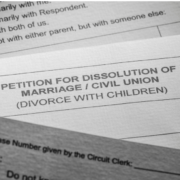Serving divorce papers is typically the first step taken during the divorce process. One party will file for either a no-fault or fault-based divorce through a lawyer. This attorney will put together the proper divorce paperwork and have it served to the other party to start the process.
But what happens after divorce papers are filed and served? It often varies from one divorce case to the next.
Keep reading to find out which steps take place once divorce papers have been filed.
The Spouse Who Received Divorce Papers Responds
The spouse who files an initial divorce complaint is considered the plaintiff in a divorce case. They must arrange to have their soon-to-be ex-spouse served with divorce papers. This spouse is considered the defendant in a divorce case and has 20 days in Pennsylvania to review the papers and respond.
In some cases, the defendant in a divorce case is expecting divorce papers and can respond to them quickly. In others, they’ll find themselves caught off guard and want to connect with a divorce lawyer before taking any further action to learn the answers to questions like, “What happens after divorce papers are filed?”
A Divorcing Couple Goes Through a Separation Period
In Pennsylvania, married couples aren’t allowed to simply file for divorce and go their separate ways in a matter of days, weeks, or months. Even if a couple plans to keep things amicable and go through a mutual consent divorce, they’ll need to endure a mandatory separation period before they can officially divorce.
In the greater Bucks County area, we follow Pennsylvania laws for divorce. The Keystone State imposes a one-year separation period for no-fault divorce cases. However, this can be shortened to 90 days (also known as the cooling off period) in instances in which the couple agrees to move forward. Fault-based divorces are an exception to this rule. They won’t need to go through a waiting period since these cases usually involve serious issues like adultery, domestic violence, substance abuse, etc.
The Rest of the Divorce Process Moves Forward
After a married couple spends a year living separately, they can go to divorce court in Pennsylvania to go through the formal divorce process. This process involves ironing out issues, such as marital property division, alimony, child custody, and more, in front of a judge.
You and your partner might also have the option to skip divorce court by coming up with a divorce agreement. Divorce lawyers for you and your partner can work on hammering out an agreement outside of court so you don’t have to deal with the stress of going through the usual divorce proceedings.
Start Working With Trusted Divorce Attorney Karen Ann Ulmer, P.C.
In some situations, the answer to the question, “What happens after divorce papers are filed?” is straightforward. In other instances, it can confuse a person going through divorce proceedings for the first time.
Karen Ann Ulmer, P.C., is here to help you make sense of the divorce process. Call (866) 311-4783 to speak with a divorce lawyer you can count on.












